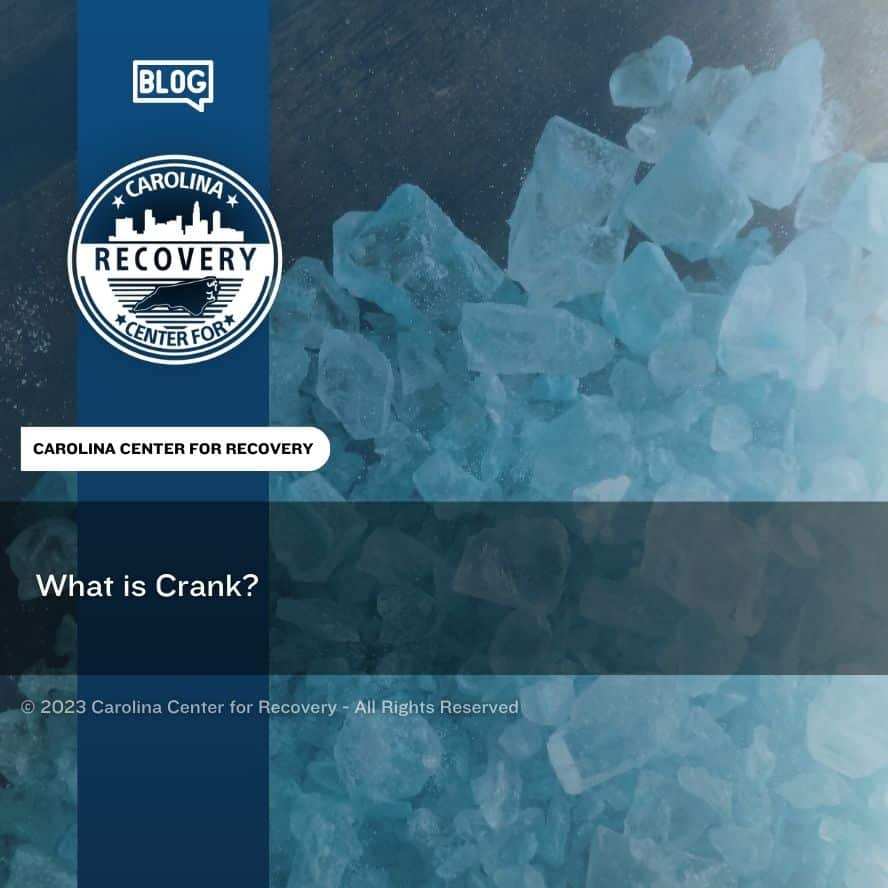What is Crank?

Medically Verified: 2/1/24
Medical Reviewer
Chief Editor

All of the information on this page has been reviewed and verified by a certified addiction professional.
Crank is a common street term for methamphetamine. Methamphetamine (meth) is a powerful, illicit stimulant. Using crank can cause immediate and long-term damage to your health and well-being.
This article will explore meth abuse and addiction. You will learn about the side effects and risks of using crank. You will also learn how to recognize crank abuse and where to find treatment.
Contact the addiction specialists at the Carolina Center for Recovery to learn about our addiction treatment programs. Our admissions team will verify your insurance, answer questions, and help you find the right type of treatment for your unique needs.
What is Crank?
Crank is a slang term for a drug called methamphetamine. Meth is an illicit, synthetic drug. People make it by combining dangerous household chemicals in illegal labs.
Other street names for methamphetamine include:
- Ice
- Speed
- Stovetop
- Shards
- Crystal meth
- L.A. Ice
- Blue
- White
- Zip
- Shaved ice
- Hot ice
- Hawaiian salt
Meth is also called crank. Many of the street names for meth refer to its appearance. The most common form of meth is small, pale crystals. Users typically ingest it by smoking, snorting, or injecting it.
Methamphetamine is highly addictive. People who use meth for even short periods have a high potential to develop addiction.
The Side Effects of Crank Abuse
Meth is a stimulant drug. This means that it increases central nervous system (CNS) activity. The drug creates a range of short-term side effects, including:
- Increased heart rate
- Elevated blood pressure
- Appetite loss
- Euphoria
- Increased energy
Crank can also affect how people feel and behave. People who use crank may experience:
- Aggression
- Memory problems
- Violent behaviors
- Depression
- Poor balance and coordination
- Difficulty with concentration
- Paranoia
- Anxiety
- Delusions
- Hallucinations
- Confusion
People who abuse crank may develop physical dependence on it.
Short and Long-Term Risks of Crank Abuse
People who use methamphetamine regularly may develop tolerance. Tolerance happens when the body adjusts to a certain amount of a substance. People with tolerance to crank may need to use more to get the desired effects.
Over time, crank abuse can change how the body and brain work. These changes can make it very difficult to stop using crank, even when it causes life-threatening problems.
Some of the long-term effects of crank abuse include:
- Skin infections and scars
- Extreme weight loss
- Malnutrition
- Lung damage
- Sexually transmitted infections
- Irreversible damage to the sinuses and nasal passages
- Severe dental problems, including lost teeth and dental decay
- Chronic runny nose
Meth use can cause permanent, life-altering consequences. Crank addiction can quickly become life-threatening. If you or someone you love abuses meth, you must seek treatment as soon as possible to avoid further harm or death.
Recognizing Meth Abuse and Addiction
The effects of crank abuse often change how a person acts, looks, and thinks. Recognizing the signs of meth abuse and addiction can help you seek treatment sooner. Earlier treatment can lead to better outcomes.
Some common signs of meth abuse include:
- Sudden, significant weight loss
- Insomnia
- Skin marks and infections from picking or scratching
- Irritability
- Confusion
- Seeing or hearing things that aren’t there
- Memory problems
- Paranoia
- Aggression
- Violent behaviors
People with addiction may have compulsive behaviors they can’t seem to control, including:
- Using more meth or using it more often
- Neglecting their relationships, responsibilities, and interests
- New legal or financial trouble related to their drug use
- Using meth in dangerous situations, like while driving
- Spending a lot of time and energy getting, using, and recovering from using meth
People who develop a methamphetamine addiction are often unable to stop using the drug without professional help. They will continue to use crank, even when facing severe consequences for their physical or mental health.
Meth Addiction Treatment
Meth addiction is a complex condition that requires comprehensive treatment. Here is an overview of what to expect during a crank rehab program.
Assessment
Before beginning treatment, your team will assess your needs and recommend a level of care. The assessment may include questions about your substance use, mental health and medical history, family history of addiction, lab testing, and more.
Detox
Your recovery process may start with a medically-supported detox program. During detox, your treatment team will monitor and treat your withdrawal symptoms, which may include:
- Depression
- Anxiety
- Delusions
- Fatigue
- Increased appetite and weight gain
- Intense cravings
You may receive medications to manage your symptoms. Your team will also provide supervision, a secure setting, and emotional support.
Treatment
Meth addiction has physical, behavioral, and emotional components. A comprehensive treatment plan will address the complexity of your substance abuse and help you move forward.
Your plan may include:
- Talk therapy
- Cognitive behavioral therapy (CBT) and other behavioral therapies
- Medications
- Group therapy
- Family therapy
- Relapse prevention education
- Medical treatment
- Mental health support
- Exercise, nutrition support, acupuncture, and other holistic therapies
- Aftercare planning
Millions of people in the United States struggle with substance abuse. If you or someone you love struggles with meth abuse, effective treatment is available at the Carolina Center for Recovery. Contact us today to learn more.

